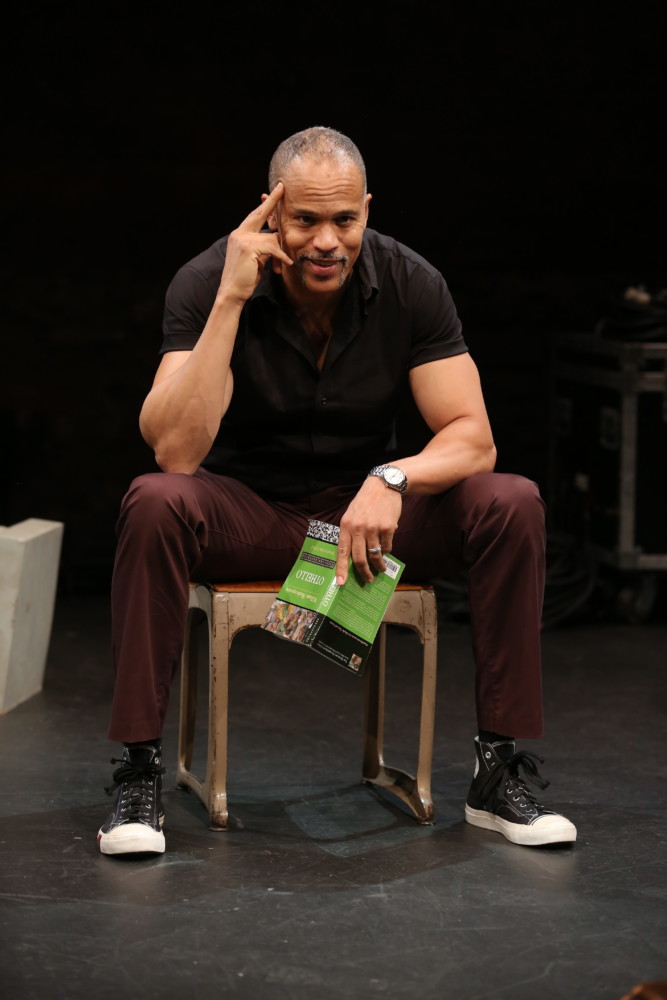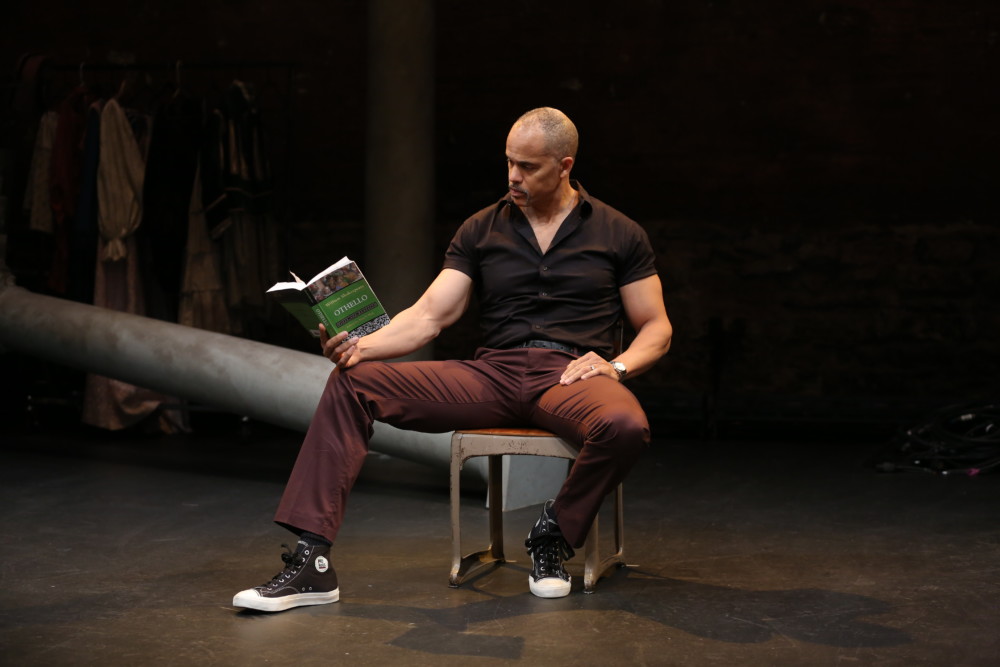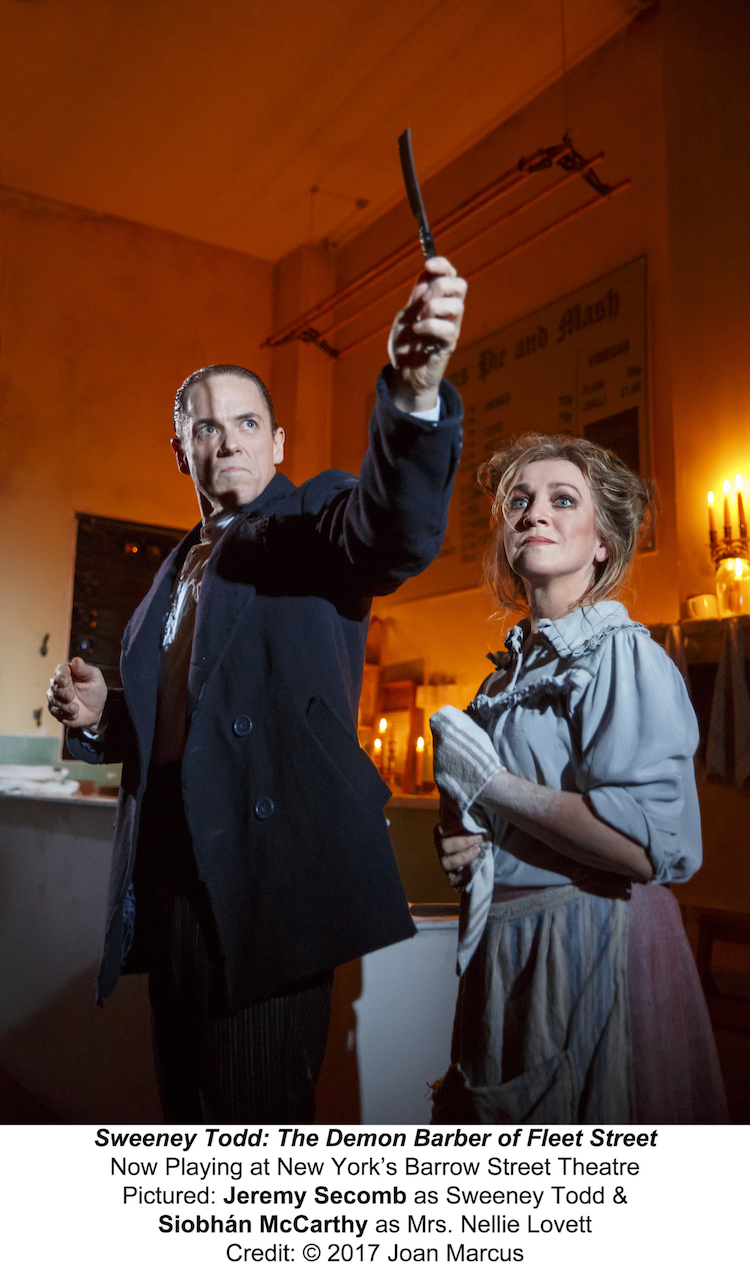by Carol Rocamora
What does it mean to be black in America? What does it mean to be an actor? What does it mean to play Shakespeare?
Huge questions, each worthy of a play itself – numerous plays, in fact.
So the miracle of American Moor, Keith Hamilton Cobb’s unique and thrilling new theatrical work at the Cherry Lane, is that it addresses all these questions in ninety breathtaking minutes. Moreover, there’s another essential question this courageous play about identity asks: What does it mean to be told who you are? By someone else, that is.
Cobb creates a clever construct in which to explore all these profound questions: an audition, in which an African American actor (Cobb, himself) recites a speech from Othello for a white (American) director.
Anyone who has auditioned before knows the upsetting power dynamic of that experience: namely, superiority/inferiority, domination/ subjugation, and so on. These are also the fundamental elements of racism and its ugly history in this country.
So it’s a brilliant theatrical idea – and Cobb makes optimal use of it, alone on an empty stage (set designed by Wilson, with its fragmented Greek columns against a bare brick wall, representing the timelessness of theatre). Cobb is already onstage as we enter the theatre, pacing, waiting while we take our seats. Once the lights go down, and the performance begins, Cobb launches into a ninety-minute interior monologue/stream-of-consciousness describing the experience, as he prepares to audition with a recitation of Othello’s speech before the Venetian Senate.
Then comes a coup de théâtre – a voice calls out in the audience, and there’s the director (Josh Tyson), sitting in Row G on the aisle, waiting to hear Cobb’s audition. Their exchange ensues, as the director instructs, listens, and responds, while Cobb reads from Othello, pauses, and continues his interior monologue.
I was overwhelmed by Cobb’s charismatic performance – and the multi-layered content of his play, deftly directed by Kim Weild. The passages in which he describes his passion for Shakespeare, his love of The Bard’s words, and his dream to play any and all of the great roles – from Hamlet to Prince Hal to Romeo (even Titania!) – are deeply moving. So is the revelation that – for a black actor of his “physical type” (6’4”) and all that implies in our culture – these opportunities are not possible. I also learned what it feels like for a black actor to be told by a white director who Othello is. “Shakespeare means that…,” the director begins, to which Cobb responds: “Purely by virtue of being born black in America, I know more about who this dude is than any graduate program could ever teach you.” But of course that’s part of his interior monologue.
This growing anger – from being told who you are and who Othello is – eventually erupts into a rage that Cobb attempts to control and subdue. “Put on your poker face, Brotha,” he tells himself, as the humiliating cycle continues. After all, as he explains, he wants the part.
Most significantly, I learned – or rather, began to get an inkling of – what it really means to be black in America. It’s a topic that has been filling our stages in recent years with increasing passion and urgency – but for me, this particular play has been a revelation, an epiphany. The interior monologues, the recitations of Othello’s powerful speeches, the tense interactions between actor and director – all these component parts of Cobb’s play crescendo to a passionate plea on the part of this amazing actor: “Hear me! See me!” It’s not a cry of rage (though it should be) – rather, it’s an invitation, a supplication.
“Commune with me in contemplation of the magnitude of moment before us,” Cobb writes in the program notes. In the theatre, as Cobb shows us in his magnificent performance, a passionate plea for humanity and understanding is far more powerful than rage.
Photos: Nina Wurtzel
American Moor, by Keith Hamilton Cobb, directed by Kim Weild, a Red Bull Theater production at the Cherry Lane Theatre, now through October 5























